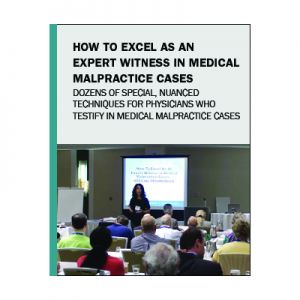Cross Examination of an Expert Witness with a Learned Treatise
Excerpted from SEAK’s Course: How to Excel as an Expert Witness in Medical Malpractice Cases
Confronting the witness with potentially contrary literature, right, so sometimes counsel can read from contrary literature in cross-examining the expert, and that comes up particularly when the expert has admitted that there…that a certain source is authoritative, right?
So we covered that a little bit yesterday, but on cross, I could literally, without warning…I don’t have to give you notice. I don’t have to get a retaining counsel notice. I can just come up to you with that text that you said was authoritative and start reading from it and saying, “You said these are the four signs that would warrant referring somebody for a spinal tap. Well, this is what your authoritative source says, that these are the sources and that these are the signs and symptoms.”
And it can be a very effective way to deflate an expert witness, so if you have… In the past, has anybody here ever made a statement that a certain medical text or treatise was authoritative? Anybody here at all? Okay, so don’t be surprised if, at some point in the future, you might be faced with that, okay? But one thing to keep in mind is that attorneys are not above reading things out of context. All right? Saying things and maybe leaving out key parts, so don’t be so quick to admit that “Yeah, it is contrary. I’d have to see that. I want to see. I want to see in what context that statement was made” before you quickly agree “Yes or no.” Okay?
What I find is that attorneys have a whole different definition of authoritative than the rest of the world.
I know, yeah, that attorneys have a different definition. Unfortunately, their definition is what allows them to cross-examine you with that text. That’s the problem, right? The problem is that you’re in their world. When you’re in this world of litigation, you’re in their world, okay? So don’t be so quick to agree that it’s contrary. Ask to see it. Literature is not the final word, right? So literature is one source, but that’s not how you practice medicine. You look at the patient, too. You rely on the facts and sometimes… many times, literature has qualifiers, disclaimers that say, “We’re a guide. You also have to have clinical correlation before you rely on this.”
The problem is that the word ‘reliable’ is sometimes used interchangeably with the word authoritative in the legal world, so the word ‘reference’, I think, is a safer word. If your opinion… If you have citations to medical literature in your report, and you know you cited that report… Sorry, you cited that citation in support of your opinion, that was a reference that supports your opinion as opposed to “I relied on that.” Okay?

